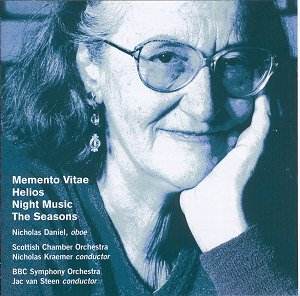This is a disc that represents an important new
departure for the NMC label into the sphere of reissues. The initial
delving into the catalogues of Unicorn-Kanchana and the much lamented
Collins Classics is already looking as if it could pay significant
dividends with re-releases of Hugh Wood, John Buller and David
Matthews already available. These are soon to be followed by Nigel
Osborne, John Casken, Oliver Knussen (the original Unicorn-Kanchana
recording of his Third Symphony) and the Maconchy Quartets amongst
others.
Three of the works on this valuable Musgrave
release were previously available on Collins Classics although
the disc has been generously topped up with Memento Vitae,
Concerto in Homage to Beethoven, recorded within weeks
of the other works but not previously released. The admirable
playing time of 79:34 is all the more pleasing given that all
of the Ancora discs will be available at mid-price.
All four of the works on the disc demonstrate
two significant traits in Musgrave’s fertile output over the years,
namely an inherent sense of drama that can surface both musically
and visually (as in Helios where the shape of a chariot
is quite literally formed by the players) and in her terrifically
acute ear for instrumental colour and texture, the result of which
can be both beguiling and immensely exciting. Written to commemorate
the bicentennial of Beethoven’s birth in 1970, the drama in Memento
Vitae is created by the tension of past and present as well
as an underlying "structure" of conflict between the
tonalities of F major and C sharp as drawn from the final movement
of Beethoven’s Eighth Symphony. At surface level, and more
obvious to the listener, are the references woven into the music
from a number of Beethoven works. Amongst them is the Agnus
Dei from Missa Solemnis, an excerpt from the music
preceding the storm in the Pastoral Symphony which in turn
leads into Musgrave’s own storm that forms the violent heart of
the piece and perhaps most memorably the chorale from the String
Quartet Op. 132. The latter appears through the clouded textures
on four solo strings as the storm finally starts to fade into
the distance. In lesser hands there is little doubt that a piece
such as this could have resulted in disastrous consequences but
it is to Musgrave’s credit that what emerges is both sure-footed
and stamped with her own musical personality, a strength of personality
that carries the piece admirably well.
Nicholas Daniel is a convincing and eloquent
soloist in the oboe concerto Helios, the most recent of
the four works presented and a challenging vehicle for his virtuosic
skills. The "chariot" referred to above is formed by
the soloist and a group of concertante players, four woodwinds,
two horns and one trumpet, to whom Musgrave also gives parts of
considerable technical difficulty. Like Memento Vitae,
the work has a storm at its heart, a tempest that the players
battle through manfully before Helios returns home from
the pastures where his horses graze in the Islands of the Blessed.
His journey brings him along the ocean stream of Greek myth that
circles the earth. It is quite magically evoked by Musgrave as
the soloist rides the rippling waters of the woodwind.
As the title implies, Night Music, is
a dreamscape, a kaleidoscopic landscape of the imagination that
constantly shifts in mood and atmosphere. Central to the work
are two concertante horns that Musgrave moves around the orchestra,
a device also used effectively in the Clarinet Concerto
where the nature of the soloist’s material is partly dictated
by the section of the orchestra they are with at the time. Again
the sense of drama is important here for in Night Music
the horn’s material is lyrical when the two instruments are close
together. It becomes more dramatic and spatially orientated when
they separate to either side of the conductor part way through
the piece until ultimately the work draws to a close with the
first horn moving off stage.
The Seasons was written to a commission
from The Academy of St. Martin in the Fields, the inspiration
initially springing from a visit to the Metropolitan Museum of
Art in New York and in particular Piero di Cosimo’s Caccia Primitiva.
The four movements, commencing with Autumn, the most violent
and destructive in character, take the listener on a kind of seasonal
tour of the world. The lyrical solo oboe in the otherwise chilling
Winter quotes briefly The Star Spangled Banner (a
reference to the painting ‘Washington Crossing the Frozen Delaware’
by Leutze) until in celebratory Summer both the American
and French national anthems are quoted, the catalyst for the French
anthem being Van Gogh’s ‘Le 14 juillet à Paris’ as well
as paintings by Jaspar Johns and Monet.
All of the performances are splendid and do the
music full justice although I would single out the Scottish Chamber
Orchestra for their contribution both collectively and individually,
the concertante parts despatched with confidence and considerable
style.
A final point worthy of note is that there is
a degree of doubling up for collectors here. However, I would
say that for anyone who owns the original Collins Classics release
of Helios etc. the acquisition of this mid-price re-issue
is more than justified by the inclusion of Memento Vitae.
The Seasons also exists in a performance by the BBC Scottish
Symphony Orchestra under the composer on Cala (CACD 1023) coupled
with the Autumn Sonata for Bass Clarinet and Orchestra
and the wonderfully exhilarating Clarinet Concerto, for
which there is no other current rival [review].
For this reason alone I would not want to be without all three
discs in my collection.
Christopher Thomas.
See also review
by Hubert Culot
